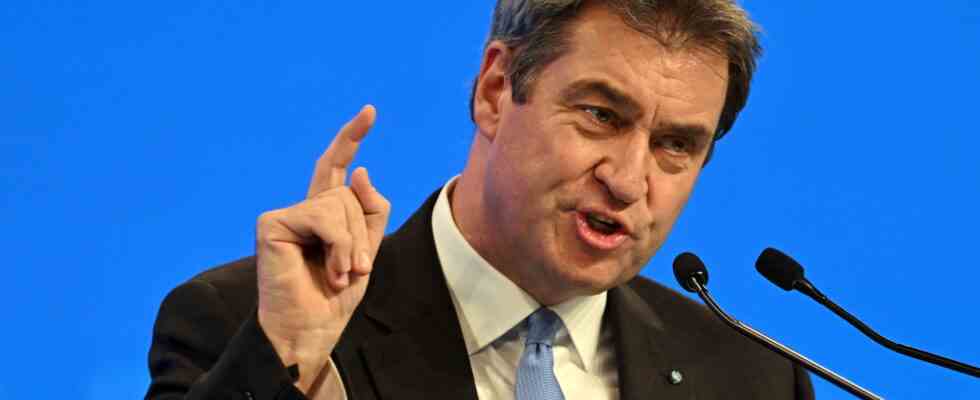Status: 10/31/2022 12:37 p.m
Criticism of the planned citizens’ income continues to come from the Union. CSU boss Söder warned of “socially unjust effects”. While SPD leader Esken signaled a willingness to talk, General Secretary Kühnert accused the CDU and CSU of populism.
In the dispute over the planned citizens’ income, Bavaria’s Prime Minister Markus Söder also spoke up. After the CDU threatened to block the reform in the Bundesrat, the head of the sister party also called for far-reaching changes.
The previous plans of the traffic light coalition went in the “fundamentally wrong direction” and would have “absolutely socially unjust effects,” said the CSU chairman in a joint statement Morning magazine from ARD and ZDF. “That’s why it needs more than just a bit of cosmetics. It needs a major overhaul.”
Markus Söder, CSU: “And it’s not really good news for the citizens to only have it once in December. It has to go faster and it has to be much more efficient and apply to everyone.”
Tagesschau 09:55 a.m., 31.10.2022
Söder expects social upheaval
Söder complained about a “complete reversal of the principle that those who work must have more than those who don’t work”. There is a risk that those who receive citizenship income will end up having more money than those who are employed.
He expects social upheaval among people in lower income groups through an introduction. It is unfair that cashiers, bus drivers, police officers and hairdressers have less money when they work than when they don’t work. Söder also criticized the amount of assets that should remain unaffected by the citizen benefit.
Union faction Vice Gröhe for mediation
CDU General Secretary Mario Czaja had previously threatened to block the Bundesrat. It will not be possible to agree to the plans in their current form, he told the “Tagesspiegel”. He assumes “that we will have to talk about it in the mediation committee,” said Czaja.
Union faction deputy Hermann Gröhe also advocated a mediation process: “It makes sense if the traffic light agrees to correct the profound weaving errors of their project,” said the CDU politician to the “Rheinische Post”. They support “explicitly an adjustment for inflation”. The Union is committed to ensuring that the increase comes into force on January 1, 2023. “There are ways and means for this outside of the Citizens’ Income Act,” said the CDU politician.
Esken: Ready to clarify details
The SPD chairwoman Saskia Esken signaled willingness to talk. “If the union-led federal states want to clarify detailed questions about citizen income, we are ready to do so,” she told the Funke media group.
However, the project is “not just about compensating for inflation, but above all about the respect that people in need have earned and about sustainable ways of overcoming this need.” Esken sharply criticized Czaja’s threat: “Blockade is not an attitude for a responsible opposition.”
“Transparent and populist manoeuvre”
SPD General Secretary Kevin Kühnert called the Union’s criticism “a transparent and populist maneuver”. The rules on protective assets are “not a new invention”, but were decided by the Union and SPD at the beginning of the corona pandemic, he told the “Tagesspiegel”.
“Friedrich Merz’s party is once again ready to throw any seriousness overboard for a quick headline, and at the same time to drag the policy shaped by Chancellor Merkel into the dirt,” said Kühnert. He accused the Union of trying to split. “The SPD will not allow working people on low incomes to be played off against the unemployed. Trying to pit these groups against each other is shameless.”
The Greens and the FDP also criticize the Union
Greens leader Ricarda Lang described it as “irresponsible” to delay the introduction of citizen income “under the pretext of detailed questions” in the current crisis. The Union’s “blockade attitude” irritates her, she told the “Tagesspiegel”. Anyone who calls for more relief every day should not leave people out in the rain when it comes to implementing them. It is the responsibility of all parties to ensure social security and to strengthen cohesion in the country.
The third coalition partner also criticized the Union: It was not the time “for party tactical maneuvers,” said FDP General Secretary Bijan Djir-Sarai to the “Tagesspiegel”. Delay and blockage have nothing to do with responsibility.
Tight schedule
There has been a long-standing dispute in the ongoing legislative process on citizen income. It is unclear whether the traffic light can push through the reform as planned. The second and third reading of the law in the Bundestag is scheduled for November 10th. After that, it will be passed to the Bundesrat, where Union-led countries must agree. A blockade could also affect the already tight schedule. January 1st is planned for the start.
Citizens’ income is intended to replace the previous Hartz IV basic security. The aim of the traffic light coalition is to put those affected in a position to be able to concentrate more on further training and looking for work. They should be put under less pressure by the job center.
There is a problem with citizen money – the Union wants changes
Kai Clement, ARD Berlin, 30.10.2022 09:42 a.m

